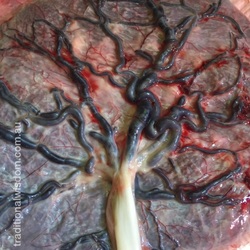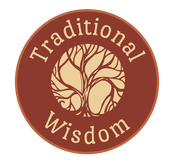However, this theory is easily discredited for a few reasons (1)
- Animals with very few predators will still eat their afterbirth.
- Non-nesting species will remain at the birth site (even after their young can walk) to ingest their placenta.
- Some primates will spend hours eating the afterbirth (when it would be quicker and cleaner to drop it out of the tree).
- Birth fluids are not consumed or 'cleaned up' even though these could attract predators to them.
Possible evolutionary benefits of placenta ingestion
The mothers immune system is affected by the fetus during gestation. There can be problems if the mother forms antibodies to the antigens present in either fetus and/or placenta (as in the case of Rh-incompatibility).
Interesting research (1) has found that eating the placenta can help prevent the formation of these antibodies. It is like an immunization against the antibodies. So, eating the placenta may well be ‘nature’s remedy’ to increase the chance of healthy young in future pregnancies.
Two other evolutionary benefits of placenta ingestions are:
Benefiting lactation, increasing milk production and flow.
The placenta is packed full of nutrients that help the mother get off to a good start and therefore increases her ability to nurture her young
Amazingly, iron deficiency is the most common single nutrient deficiency in the world (2). Being low in iron generally results in fatigue, lethargy and less vigilance in performing tasks. Postnatally, iron deficiency can effect a woman's moods, ability to care for her children and ability to engage in household tasks (3).
Due to the demands of looking after a newborn, women often report an increase in fatigue during the postpartum period4. Research has found that severe postpartum fatigue can be a predictor of postpartum depression (4,5).
Early education and nutritional interventions to help reduce fatigue may help prevent depression developing. Obviously extra physical and emotional support is also very helpful in the postpartum time. Another early intervention that could be considered is placenta ingestion, because the placenta contains on average 75mg of iron per 100g of fresh placenta (6).
In Traditional Chinese Medicine, the placenta has been used medicinally for thousands of years. Placenta ingestion or placentophagy is becoming increasingly popular due to the huge benefits mothers are feeling. Because iron deficiency is linked to fatigue, and fatigue is linked to postpartum depression, it makes sense that supplementing with iron (or placenta) can help prevent iron deficiency and therefore help prevent postpartum depression.
A happy and energetic mother will have a better time in the crucial postpartum period (and so will her baby)!
So, now how to do feel about eating your placenta?
References:
- Kristal, Mark. Placentophagia: A biobehavioral Enigma. Neuroscience & Biobehavioral Reviews 1980;4:141-150.
- Beard, J; Hendricks, M; Perez, E; Murray-Kolb, L; Berg, A; Vernon-Feagans, L; Irlam, J; Isaacs, W; Sive, A and Tomlinson, M. Maternal iron deficiency anemia affects postpartum emotions and cognition. The Journal of Nutrition 2004;267-272.
- Bodnar, L; Cogswell, M and McDonald, T. Have we forgotten the significance of postpartum iron deficiency? American Journal of Obstetrics and Gynecology 2005;193:36-44
- Bozoky, I and Corwin, E. Fatigue as a predictor of postpartum depression. JOGNN 2002;31:436-443.
- Corwin, E; Brownstead, J; Barton, N; Heckard, S and Morin, K. The impact of fatigue on the development of postpartum depression. JOGNN 2005;34:577-586.
- McCov, B; Bleiler, R and Ohlson, M. Iron content of intact placentas and cords. The American Journal of Clinical Nutrition 1961;9:613-615.


 RSS Feed
RSS Feed
